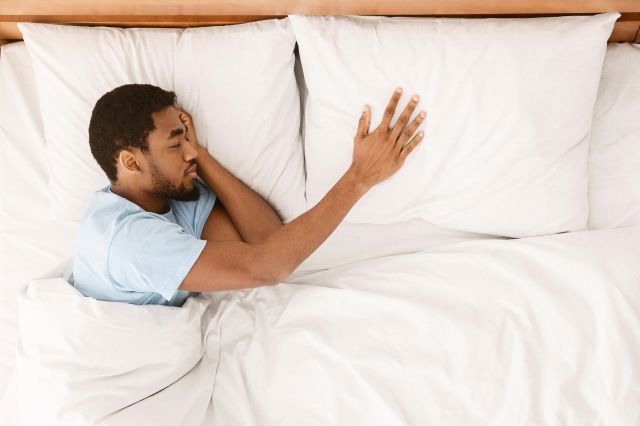Updated on December 21, 2022.
There’s nothing like a good night’s sleep. It can reduce stress and lift your mood, keep you healthy, and help you function better at work, home, and at play. For some people, getting proper shut-eye requires carefully curated, quiet conditions. But these are not always possible if you have a partner who tosses, turns, snores, or watches TV late into the night.
In a 2018 survey of 2,000 U.S. adults, one in five said their partner was the main factor disturbing their sleep. Forty-six percent of respondents wished they could have a sleep break-up from their partner, and 57 percent said they snuck out of bed some nights to get better rest.
Though many couples tough it out and sleep together—even when one is disrupting the other—you don’t have to. It may be time to consider sleeping in separate beds or rooms (at least temporarily) or opting for other solutions to ensure you both wake up feeling refreshed and ready for the day.
Nocturnal interference
Adults generally need seven to nine hours of quality sleep each night. Routinely getting less than that can increase your risk of getting sick. Our bodies produce proteins known as cytokines when we sleep. These are important for boosting the immune system and staving off colds and flu. When we are sleep deprived, our bodies’ production of cytokines dips.
It’s no surprise that people who sleep with snorers tend to report having fatigue, sleepiness, and insomnia. The downsides of inadequate rest can manifest in smaller ways, too, like increasing your cravings for junk food. A sleep deficit can also lead to serious problems, such as an increased chance of car accidents related to drowsy driving.
Chronic lack of sleep can also increase the risk of conditions including:
- Colorectal cancer
- Type 2 diabetes
- High blood pressure
- Heart disease
- Depression and anxiety
- Dementia
Taking a time out
If your partner has a temporary issue—such a cold or flu or if they’re pulling late nights to finish a big project—a temporary sleep separation might be all that’s required to help you catch up on your zzzz’s. If your partner’s a kicker, a blanket hog, or has different temperature needs than you do but otherwise sleeps quietly, you could try separate beds in the same room (à la Lucy and Ricky on I Love Lucy).
Another option is known as a ‘sleep divorce.’ This may be a more permanent solution for people whose partners are experiencing chronic sleep troubles such as snoring, sleep apnea, numerous nocturnal bathroom trips, or a sleep-wake schedule that is consistently at odds with yours. In these cases, you may opt for separate rooms.
Couples are increasingly using this option with an eye toward improving their relationships in addition to their personal well-being. A study from the University of California, Berkeley suggests that sleep affects how much gratitude a person has for their partner. Unsurprisingly, that feeling can be drained if one partner spends the night getting kicked by the other's restless legs. If you are dragging through each day as a result of poor co-sleeping, you may be less likely to give your partner the benefit of the doubt.
Just remember that it can take a while to recover from even a little lost sleep, so you may need to give a sleep divorce time to work. According to a 2021 study in PLOS One, participants who had 30 percent less sleep than usual over a 10-day period took more than a week to return to normal.
Couples who sleep together…
Moving to a different room may help some people get more restful sleep, but it’s not the solution for everyone. If you feel that sharing a bed is best, know that this option can also be beneficial for your physical and emotional health.
If you’re busy with work and kids, bedtime may be your only chance to be alone with your partner to talk and connect. It’s also more likely you’ll make sexual intimacy a priority if you share the same bed.
In fact, many partnered people claim to sleep better when snuggled next to their significant other. A 2022 study in Sleep of about 1,000 working-age adults, found that couples who co-slept most of the time had less insomnia, got more sleep, were less fatigued during the day, had a lower risk of sleep apnea, fell asleep more quickly, and woke up less during the night. Study authors found that people who shared beds with their partners also reported less depression, anxiety, and stress, and more satisfaction with their life and relationships.
Another small, German study published in 2020 in Frontiers in Psychology found that healthy, childless heterosexual couples who slept together had 10 percent more REM sleep and less fragmented and more undisturbed time in REM than those who slept apart.
Your best solution for you
There’s no one way to manage sleep issues between partners. Whether you decide to co-sleep, sleep apart, or create a hybrid situation, make sure you’re both comfortable with the arrangement.
If you decide to sleep together, work with your partner to ensure you both get a good night’s sleep. If they have sleep apnea, make sure they wear their CPAP machine regularly or go to their healthcare provider for other solutions. If body temperature is a problem, you may consider beds that regulate temperature for both of you. If your partner snores, try putting yourself to bed first so you’re sound asleep before they start sawing logs.
If you want to broach the subject of a sleep divorce, reassure your partner that you love them but your sleep styles are making daytimes difficult. If you move to separate rooms, continue to get quality time together and schedule sex if needed.
Regardless of what works best for you, it’s important to talk openly about your sleep problems, how they impact you, and different options that might help. Don’t be afraid to try different tactics until you find what makes you both comfortable.







